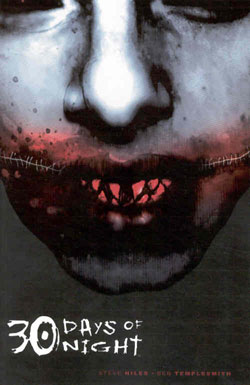|
 |
WAITING
FOR TOMMY: ADAM FORTIER
BY
RICHARD JOHNSTON RICHARD:
Will you cop to any mistakes on your own part?
ADAM: The largest mistake that I've ever made is not having
realistic expectations out of this industry. That sounds harsh,
but it's really not. In comics, each retailer is an individual,
same thing with artists, writers, etc. Unlike many other industries
with chains, we deal with stores on an individual basis, which
is quite tough. A sweeping policy that affects everyone is
going to be seen as a good idea by some retailers, most won't
acre, and some will see it as a bad idea. The only thing that
can be done to correct this is to talk to each one individually,
and find out what their preferences are. Same thing with artists.
You can't create a sweeping policy that affects everyone equally,
as all of the artists have different styles of working, different
attitudes, etc. Coming from a corporate environment, you act
a certain way, provide a certain work ethic (don't be too
lazy, but also don't work TOO hard!) and if you don't follow
things, you're fired. Comics is a mix of the business and
art, and there's just no real way to apply one philosophy
to the other. I had to learn that lesson, and start having
realistic expectations from everyone, not sweeping expectations
that applied to everyone equally.
RICHARD:
The licensed comic - it seemed the saviour of the industry
a couple of years ago, bringing hundreds and thousands of
new readers into comic shops. But those sales seem a fantasy
these days. What can the license bring the industry in 2004?
ADAM: When the licensed comic was brought back a couple
of years ago, the content was perfect for the industry as
it stood (remembering that licensed comics have been around
for a LONG time, even before the super-hero comic. Every decade
or so they come back). Transformers, GI Joe, etc. were all
properties that the current fans played with as children.
In 2004 I think we're going to be seeing more properties with
a wider range of appeal, and we'll need to work at getting
out of the direct market. Comics on TV, Movies, books, pop
culture icons, etc. will be showing up, and we'll need to
get the comics into the hands of people interested in those
things. Whether it means book stores, Video game stores, or
mass market chains, we're going to have to look at alternate
methods of distributing.
RICHARD:
That's been the dream for many over the years, comics in cinemas,
video game stores, back into grocery stores, but the best
laid plans often go tits up - how will you succeed where others
have failed recently?
ADAM: First off, I would disagree that it's impossible.
There are some success stories out there. Whether it be Archie,
which is still sold in grocery stores, or the Ultimate Spiderman
TPB, which has sold enough to be considered a respectable
seller for the book stores, but less successful by comic book
standards. Problem is, these are the exceptions to the rule,
not the regular occurrences. It all comes down to realistic
expectations. Right now the majority of product created by
the industry is considered adult in nature, and so we're killing
a lot of the audience that we might have in grocery stores,
video game stores, and cinemas. The reality of the content
doesn't matter, just what people THINK they're going to get.
I would say we need to create more content that is universally
acceptable. Do you think only children went to Spider-Man,
or even Harry Potter? It's fine to have adult oriented books,
as we can sell those, and some of them are great books, to
boot.
Another
thing that I have a problem with is our price point. Right
now, for the sales in the direct market, the price is reasonable.
But if you want to go back to grocery store sales, you'll
need to drop the price a fair amount. If you're getting good
sales in the mass market the lower price won't matter, as
the volume will more than make up for it. Unfortunately do
really do that properly takes a lot of risk, with the small
potential of a large reward. You can't succeed without trying
something risky, though.
Finally,
there's the amount of books that are being published. Take
Spider-man , or even Batman as an example. Which books do
you put into the mass market? When someone picks up Batman,
does that mean that Detective is appropriate for them, or
Batgirl, Robin, Catwoman, Gotham Nights, etc. To an outsider
it seems that we're talking about a monthly payment of $25-30
just to pick up a single character that you like. Out forth
a single book or two as the appropriate book for the mass
market, and you'll have better luck. Ultimate Spider-Man did
a great job at that, as well as the Jim Lee Batman series.
As for
why we might have more success, we pay attention to our price
points, the content is appropriate for the audience we're
aiming for, and we only have a small amount of the product
being created for the specific market (there's only one CSI
TPB out right now, so it's an easy choice on what to purchase).
This doesn't guarantee success, but it takes a bit of the
guess work out of it.
Pages:
1 | 2
| 3 | 4
Continued Here...
|
 |







